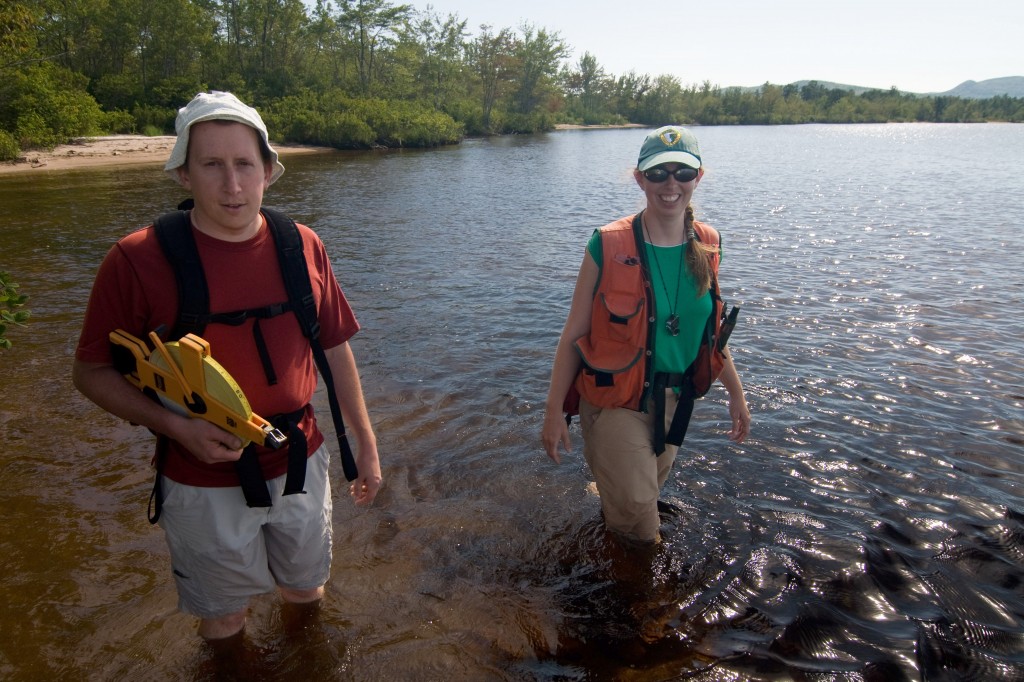For the upcoming Reach the Beach Relay race our team from the New Hampshire Division of Parks & Recreation is running for Lyme Disease Awareness, an issue that has been avoided, misunderstood and has also seriously affected members of our state department family. Field staff whose profession (and passion) brings them to remote corners of New Hampshire often share their personal encounters with this infection to help us better understand the disease. With this emotional connection, Lyme awareness has become a particularly important cause for our team and also for the Division of Parks & Recreation.
To learn more about what it is like to live with Lyme Disease we sat down with one of our co-workers, Melissa who works in the Division of Forests and Lands…
Melissa is an Environmental Information Specialist with the Natural Heritage Bureau who does environmental review for potential impacts to state-listed plant species and exemplary natural communities. Her interests are botany, ecology, and outdoor activities such as: hiking, climbing, cycling, running, and gardening…so she’s happens to be around ticks a lot!
How did you first find out you had Lyme Disease?
I had an intense headache and neckache (very stiff neck) and low grade fever that lasted for 14 days when I finally decided I should see a doctor. I had blood work to test for Lyme (as well as other possibilities), while waiting for results to come back other strange symptoms appeared: jaw pain, neurological symptoms (particularly skin sensitivities), and heart palpitations. My test for Lyme came back positive and I started antibiotics immediately after that. I developed heart complications 3 days later.
How has Lyme Disease affected you?
Lyme bacteria can attack various parts of your body. You hear about joints and tendons a lot but there are many other possibilities. I fell into the unlucky 10% that develop heart complications from Lyme. The Lyme bacteria can cause inflammation in heart tissue that then disrupt the electrical signaling that occurs in the heart, leading to what is called an atrioventricular heart block. This prevents the proper signaling between the upper and lower chambers of the heart. So I was hospitalized and got IV antibiotics to get my heart back to normal. I’m young, healthy and athletic, so having a heart complication was shocking and scary. It spurred a lot of “life reflection” and a renewed and stronger appreciation for good health and wellness and not to take these things for granted. I had very little energy and thus had to skip out on most of the usual activities I enjoy this summer. So I feel a bit robbed of a summer. Though I did catch up on reading!
Are you cured or will this be a long term struggle?
Not completely sure at this point, but I am hopeful that I am cured because I was treated early. There are a lot of scary stories out there though about long-term struggles.
What advice do you have for people at risk?
Tuck and spray! Don’t be afraid to look goofy with socks pulled up over your pants (or just wear gaitors). I never used bug sprays because I’m not a fan of chemicals. But I’ve changed my mind about that one. Permethrin is supposed to work best for repelling ticks (treat your clothes, not your skin). Always do a tick check (though I never found the one that gave me Lyme). Know the symptoms and be able recognize them early! Lots of people never get the classic bull’s eye rash, there are many other symptoms to be aware of, know them!
What can someone do if they’ve been just diagnosed?
Make sure you share ALL your symptoms with your doctor. I mention this because of the heart complications I had, which was a big deal and had I not had a follow-up appointment already in place, I probably would not have contacted my doctor again to mention that symptom. Read, educate yourself on the matter. Try to stay positive and hopeful about healing. Rest, rest, rest (which is so difficult for active outdoorsy types, I know!).
Help us support this noble cause! Find out more about programs in New Hampshire that are dedicated to prevention, education, support and treatment of Lyme Disease and other co-infections carried by ticks. If you are able to, consider making a donation to our partners at Lyme411. Any amount adds ups to make a big impact. If you cannot help financially, please take the time to learn more about Lyme411 and their efforts throughout the year so that you can help connect others affected by Lyme Disease.


